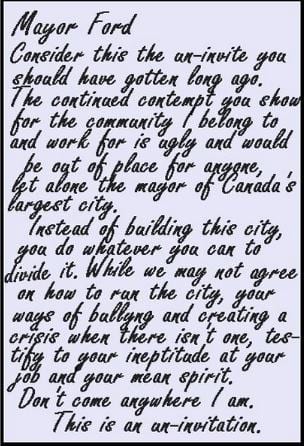
A letter to Rob Ford from Pride Toronto board member Roy Mitchell. Credit: Roy Mitchell
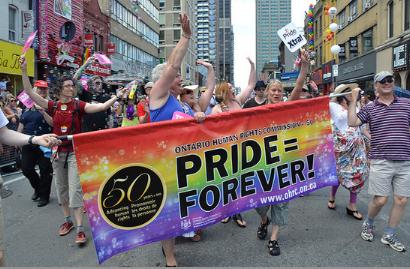
Former Toronto mayor Barbara Hall marching in Pride 2011 with a contingent from the Ontario Human Rights Commission. Credit: Andrea Houston
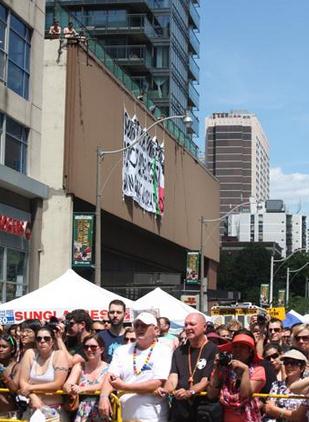
Although they didn't march in the parade, Queers Against Israeli Apartheid dropped a 40-foot banner off the roof of the Wellesley subway station during the parade. Credit: Marcus McCann (Xtra file photo)
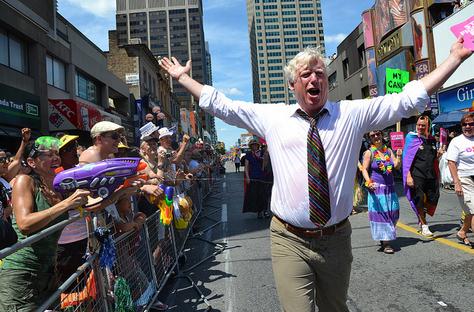
Former Toronto mayor David Miller hams it up as he gets doused by water guns at the 2011 parade. Credit: Andrea Houston
Two years ago Pride Toronto (PT) was embroiled in a censorship scandal, on the verge of financial collapse and appeared disconnected from a large portion of the queer community.
Kevin Beaulieu is now at the helm as the new executive director, and in many ways it seems the organization is finally able to bring this rocky chapter to a close.
Six months into the job, Beaulieu sat down with Xtra to discuss plans for Pride 2012 and WorldPride 2014. He says PT has taken a major turn in the right direction.
And while planning for this summer’s festival is kicking into high gear, the first controversy Beaulieu had to face was a familiar one. Mayor Rob Ford has, once again, declined Pride’s invitation to attend the parade.
“Whether or not an elected official is trying to send a message with their acceptance or non-acceptance of the invitation, it will often be perceived that way,” says Beaulieu. “We all remember how hard we struggled to gain acceptance. We’re not interested in going back to a time when we have to be ashamed of who we are, so it’s important that the people who represent us electorally understand the importance of connecting with our communities.”
Others at PT are more frustrated. On May 10, board member Roy Mitchell uninvited Ford.
“Consider this the un-invite you should have gotten long ago. The continued contempt you show for the community I belong to and work for is ugly and would be out of place for anyone, let alone the mayor of Canada’s largest city,” Mitchell wrote in a letter shared on social media.
Beaulieu — formerly Ward 27 Councillor Kristyn Wong-Tam’s executive assistant — says he understands the frustration, but he is focused on the task at hand, planning the massive 10-day festival less than two months away.
“I would say we are on schedule,” he says, noting PT is not yet ready to announce any headlining performers for the five stages. “We are quite excited about a new stage up on Church and Wellesley, which will be programmed with trans artists.”
More than 250 artists will be showcased throughout the weekend, he says. Last year, 97 percent of those who performed at Pride were Canadian and local Toronto artists, he says. “It’s a great opportunity to develop local queer talent.”
Beaulieu, who comes to Pride from a background in municipal politics, ran for council in Ward 18 in the last municipal election, coming 1,366 votes behind Ana Bailão. Prior to that, Beaulieu managed Adam Giambrone’s election campaigns in 2003 and 2006. He has a reputation around city hall as someone who is cheerful, affable, smart and diligent.
Wong-Tam, who met Beaulieu on the campaign trail, felt an instant connection and, after her win in Ward 27, recruited him to be her EA. As a rookie councillor, Wong-Tam says, Beaulieu’s extensive city hall experience was invaluable. She has even called him her “co-councillor.”
“He was the number-one draft pick with many new councillors,” she says. “Kevin is not only well liked, he has a lot of respect amongst his colleagues here.
“At Pride Toronto, he is exactly where he needs to be. He is proving himself a fantastic executive director, and he is going to take Pride through some tremendous growth. He is an asset to the LGBT community and exactly the kind of leadership that Pride needed.”
So far Beaulieu’s transition into the role of executive director has been a smooth one.
And if Pride is enjoying a renaissance with the community, Beaulieu points out that much of the credit should go to the board and the interim executive director, Glen Brown.
Financially, the organization is in “a very good” position, he says, compared to last year when PT faced a $431,000 deficit. Its audited financials, released this January, showed a $211,000 surplus. Beaulieu says cuts were made across the board in order to balance the books. The number of paid staff members has gone from 10 to five over the last two years.
Beaulieu says that working to strengthen trust in the local community is an ongoing process, noting that much of the current stability can be credited to the Community Advisory Panel. Its report, which contained 133 recommendations, included a process to ensure disputes are resolved fairly, such as the 2010 controversy surrounding the involvement of Queers Against Israeli Apartheid (QuAIA) in the Pride parade. The group chose not to march in 2011.
Last year, debate about QuAIA put city funding in jeopardy – about $123,807 in cash, as well as roughly $250,000 of in-kind services such as garbage cleanup and policing.
“Pride stands in solidarity with all of our communities. It’s important that they feel welcome at Pride and that they have a place at Pride and we support them,” Beaulieu says, noting PT is closely monitoring activity at city hall. Beaulieu thinks there’s so far no reason to be concerned that future funding is at risk.
PT is also looking ahead to 2014 and planning for WorldPride, an international party that will turn Toronto into “Pride City,” according to Beaulieu, who will lead a Toronto contingent to WorldPride in London, England, this summer.
“By international standards we already deliver a pretty big festival,” he says. “Toronto will be the first WorldPride in North America and the fourth time it’s ever been held. We are helping to define what that is, and I find that very exciting.”
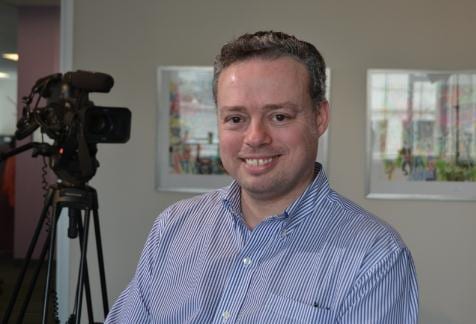
 Why you can trust Xtra
Why you can trust Xtra


